Shake Shack to Open on Central Avenue Plus More Retail News
- Details
- Written by Joanne Wallenstein
- Hits: 8416
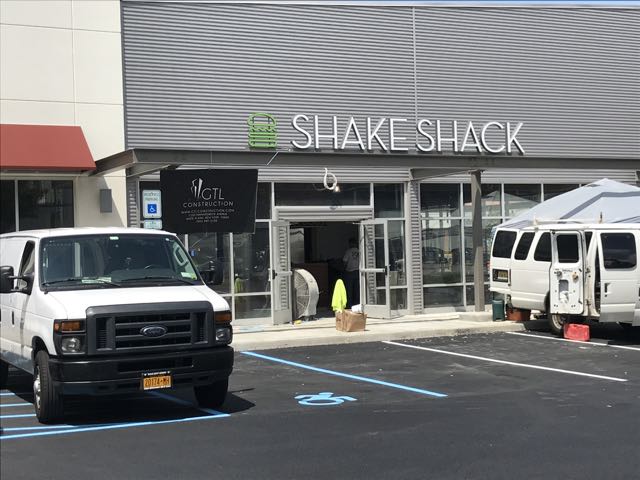 Though many people are out of town, we took a trip around town to see what August had to hold.
Though many people are out of town, we took a trip around town to see what August had to hold.
First, we noticed that a large Shake Shack is opening in the Dalewood Shopping Center on Central Avenue in front to HMart. That should be welcome news for burger lovers as Shake Shack's burgers are made from 100% all-natural Angus beef, with no antibiotics or hormones. Shake Shack also offers crispy chicken sandwiches, flat top hot dogs and cheese fries. For dessert there’s rich and creamy frozen custard with a mouthwatering choice of topping like dark chocolate chunks, chocolate truffle cookie dough and Doughnut Plant doughnuts.
Hand-spun shakes come in vanilla, chocolate, caramel, black & white, strawberry, peanut butter or coffee Fair Shake. To drink the menu includes shack-made lemonade, beer, and red and white wine. Don’t forget their breakfast sandwiches too.
I have a feeling we will all be hanging out on Central Avenue soon!
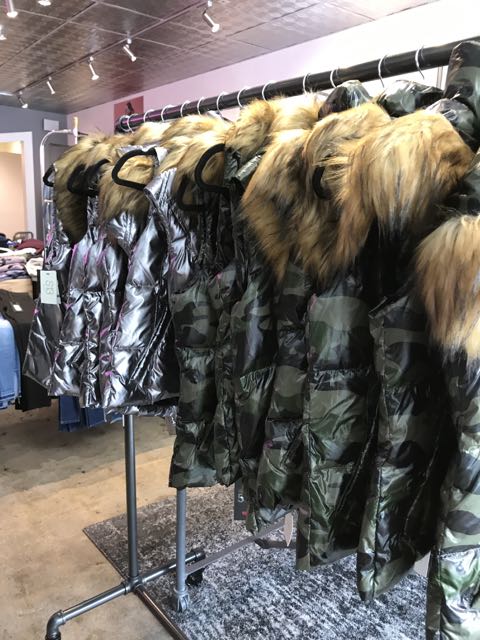 Fur trimmed vests at MixologyIn Scarsdale Village, it looks like the new bookstore is planning a late summer opening, and we’re hopeful that we'll welcome Bronx River Bookstore to Spencer Place by the end of the month.
Fur trimmed vests at MixologyIn Scarsdale Village, it looks like the new bookstore is planning a late summer opening, and we’re hopeful that we'll welcome Bronx River Bookstore to Spencer Place by the end of the month.
We found some intriguing sales of summer merchandise and great new looks for the fall.
At Mixology on Spencer Place, we spotted these cool camouflage or silver vests with fur-trimmed hoods that will be fun for cooler weather. Mixology is hosting a series of designer trunk shows at their Rye Brook and Scarsdale stores throughout August. Stop by to see what’s in for Back to School.
There were many busy shoppers and tables loaded with sale 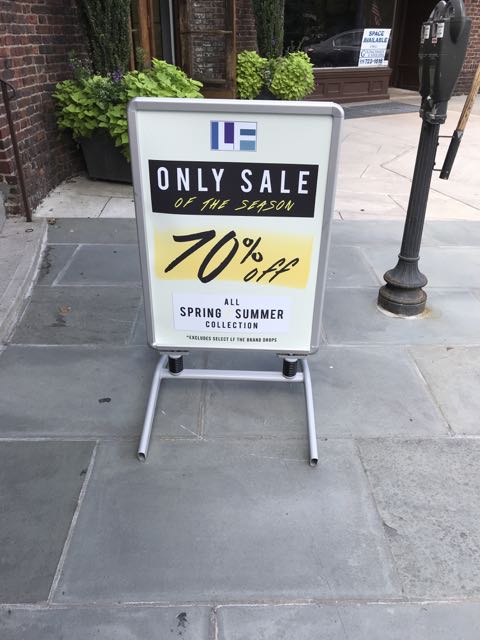 merchandise at LF on Harwood Court, where they are now offering up to 70% off on their spring and summer collection. Find denim shorts and skirts, jean, knit tees, playsuits, sweaters, woven tops and more. Just plowing through the merchandise is a good way to beat the heat.
merchandise at LF on Harwood Court, where they are now offering up to 70% off on their spring and summer collection. Find denim shorts and skirts, jean, knit tees, playsuits, sweaters, woven tops and more. Just plowing through the merchandise is a good way to beat the heat.
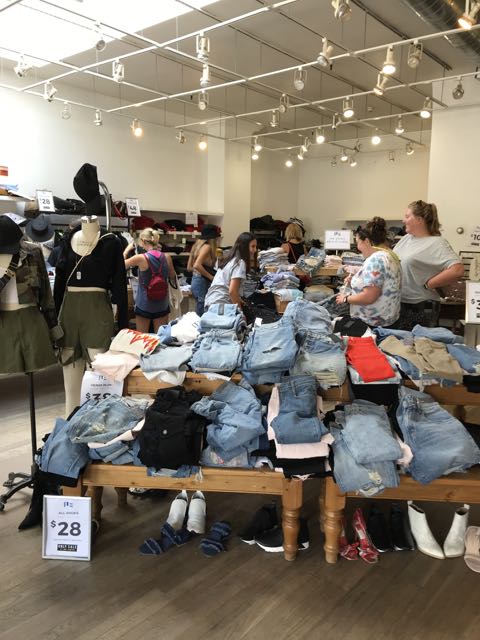 Sort through the sale merchandise at LFPookie and Sebastian on East Parkway is offering up to 75% off their summer goods and already has a nice collection for fall featured in the front of the store. Get a good deal on summer whites and cottons or try on knit sweaters, fur vests, leather jackets and and an appealing mix of tops, pants and sweaters in taupe, gray, khaki and mauve for fall.
Sort through the sale merchandise at LFPookie and Sebastian on East Parkway is offering up to 75% off their summer goods and already has a nice collection for fall featured in the front of the store. Get a good deal on summer whites and cottons or try on knit sweaters, fur vests, leather jackets and and an appealing mix of tops, pants and sweaters in taupe, gray, khaki and mauve for fall.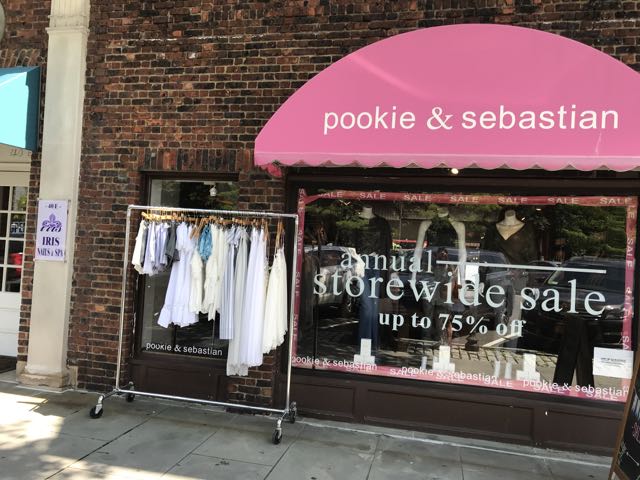 Pookie and Sebastian
Pookie and Sebastian
I Am More on Spencer Place also has a summer sale in progress. We liked this display of silky camis paired with cut off denim shorts. They also have a rack of jeans on sale.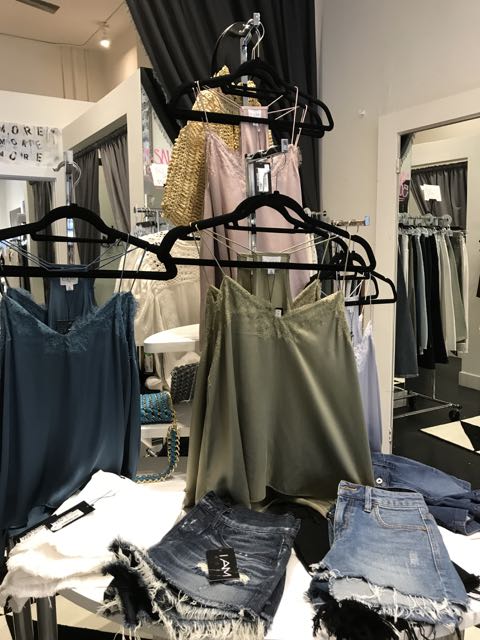 Camis and cut-offs on sale at I Am More Scarsdale
Camis and cut-offs on sale at I Am More Scarsdale
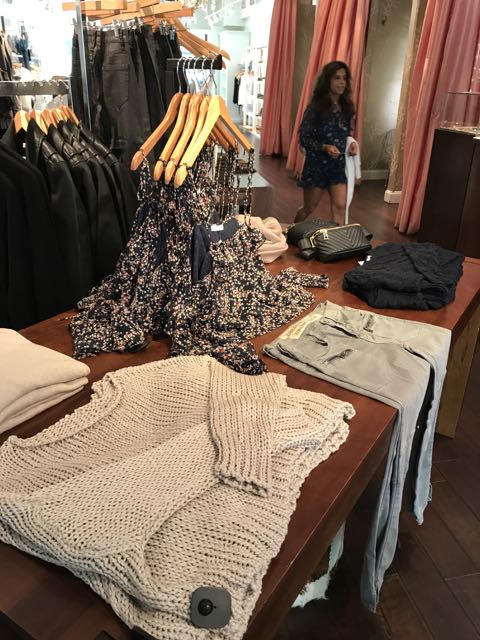 Fall colors at Pookie and Sebastian
Fall colors at Pookie and Sebastian
The Dark Horse, a unique gift shop appears to be running their summer sale on Harwood Court.
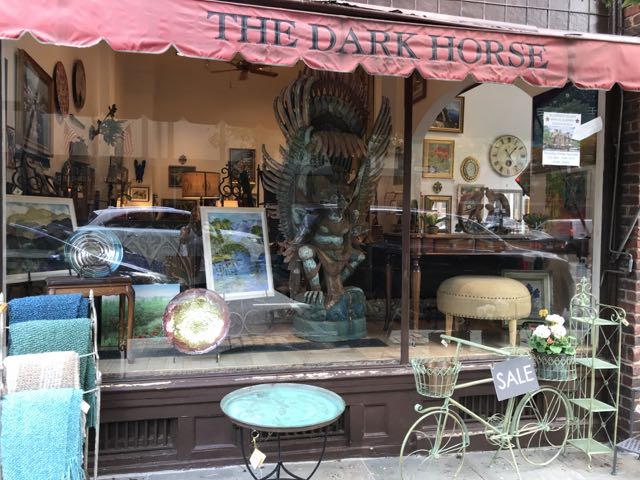 A summer sale is in progress at The Dark Horse
A summer sale is in progress at The Dark Horse
Movie Night to Support the Friends of the Scarsdale Library
- Details
- Written by FOSL Board of Directors
- Hits: 4899
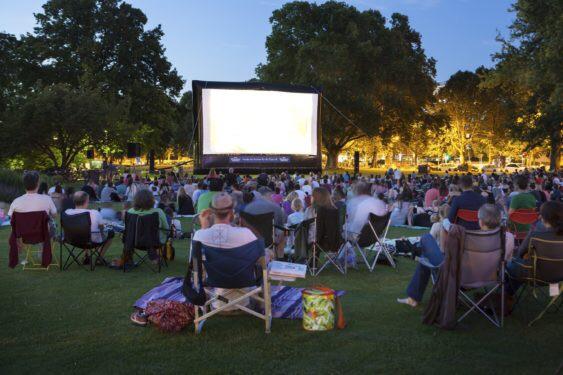 This letter was sent to Scarsdale10583 by the Friends of Scarsdale Library:
This letter was sent to Scarsdale10583 by the Friends of Scarsdale Library:
Dear Scarsdale:
The Friends of the Scarsdale Library are thrilled to announce Community Movie Night which will take place at Crossway Field on Friday, September 7th at 7:30pm. Dinner and dessert can be purchased from one of the Food Trucks starting at 6:30pm and Back to the Future will be shown at 7:30pm.
Admission to the movie is free and popcorn, blankets and frisbees will be for sale on site. Lawn games will be available for kids to have some pre-movie enjoyment. Members of the community will also have the opportunity to become a Friend of the Scarsdale Library or renew their commitment with a donation of $25 or more.
Click here to become a Friend of the Library today.
This will be a fun evening for folks of all ages! Kids under 12 must be accompanied by an adult. Cars can be parked at Crossway or by the pool. No alcohol permitted.
The residents of Scarsdale have generously supported the future of the Scarsdale Library, and the Friends are excited for the chance to give back with this amazing event!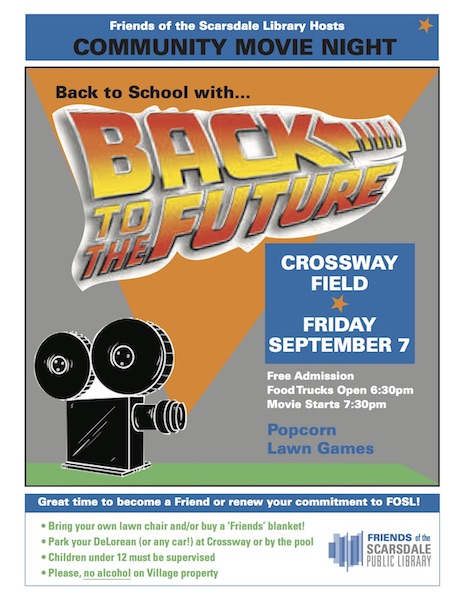
Low Income Students to Receive Free Dorm Supplies from Grad Bag on July 20
- Details
- Written by Joanne Wallenstein
- Hits: 4434
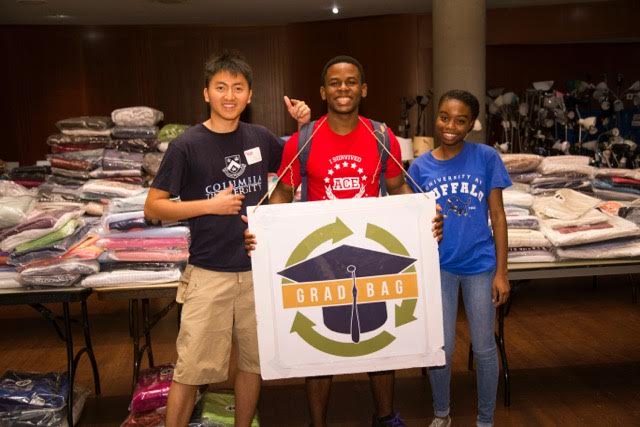 When you are the first in your family to go to college, there is already a lot to worry about financially, so it was a huge relief to Nasir Dunham, 18, of New Rochelle when he found out that he would receive all of his dorm room supplies for free. “I think it’s amazing,” said Nasir. “I was already stressing about how to pay for everything.” Thanks to Grad Bag, an organization that collects and redistributes new and lightly-used dorm room essentials, Nasir will receive full bedding including a comforter, a set of sheets and pillows as well as a rug, hangers, shower caddy and a table lamp all at no cost.
When you are the first in your family to go to college, there is already a lot to worry about financially, so it was a huge relief to Nasir Dunham, 18, of New Rochelle when he found out that he would receive all of his dorm room supplies for free. “I think it’s amazing,” said Nasir. “I was already stressing about how to pay for everything.” Thanks to Grad Bag, an organization that collects and redistributes new and lightly-used dorm room essentials, Nasir will receive full bedding including a comforter, a set of sheets and pillows as well as a rug, hangers, shower caddy and a table lamp all at no cost.
To distribute the goods it collects, Grad Bag works with Yonkers Partners in Education (YPIE), a non-profit organization that helps low-income Yonkers Public School students prepare for college. Grad Bag also works with Let’s Get Ready (LGR), a 501 (c) (3) non-profit organization that provides low-income high school students from Philadelphia, PA to Lewiston, ME with free SAT preparation, admissions counseling and other support services needed to gain admission to and graduate from college.
“As a first-generation college student, my parents didn’t have the resources to assist me with the college process. Let’s Get Ready helped me with SAT preparation and my college applications, now they are facilitating with the transition to college,” said Gensy Maldonado, 18. The New Rochelle High School graduate is excited to pick out her dorm supplies. “I am so grateful that Let’s Get Ready provides the support to make the transition easier.”
On Friday, July 20th, 100 incoming college freshmen, who are participating in YPIE’s transition workshop at the College Zone, will go to Grad Bag’s one-day pop up “shop” filled with dorm room items – all without price tags. The event will take place beginning at 9 a.m. at 600 North Broadway in Yonkers. In addition, more than 500 students in New York City, Boston and Maine will also receive free dorm room items at other events. Last year, Grad Bag gave away over 400 comforters, 700 decorative and bed pillows, 150 rugs, 400 bunches of hangers, 450 blankets, 700 twin XL sheet sets, 200 desk and standing lamps, hundreds of shower caddies and more.
According to the National Retail Federation’s 2016 Back to College Study, students spend an average of $114.21 outfitting their dorm room.
Grad Bag was founded in 2012 by two Westchester County moms, Liz Gruber and Tara Tyberg, who realized there was so many dorm room items that graduating seniors no longer needed, but were still in great condition. Instead of having the sets of XL sheets and twin comforters thrown away or gathering dust in attics, Grad Bag addresses two social issues: insuring that low-income students won’t have to stress about equipping their dorm rooms while recycling objects that would otherwise not be used.
Organic and Healthy Landscaping
- Details
- Written by Conservation Advisory Council
- Hits: 4477
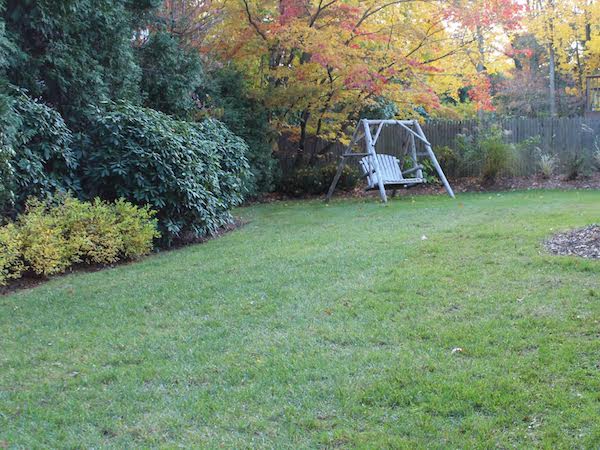 Many residents have asked how to switch to organic landscaping on their property. The Conservation Advisory Council has put together this brief overview on what it means to use organic landscaping, how to make the switch and where to find more information.
Many residents have asked how to switch to organic landscaping on their property. The Conservation Advisory Council has put together this brief overview on what it means to use organic landscaping, how to make the switch and where to find more information.
Organic landscaping uses natural products to feed lawns and help plants grow rather than using synthetic chemicals. There are also many natural ways to protect your landscape from weeds and harmful insects instead of chemical herbicides and pesticides.
For many years, Scarsdale schools, Village parks and fields, and many homes have been using organic landscaping. In the case of the schools, New York State banned the use of pesticides on school property due to safety concerns for the kids being exposed to such chemicals.
How do I know if I receive chemical or organic treatments? The easiest way to spot a chemical application is if your landscaper places a small yellow sign at the edge of your lawn. These little yellow signs, which are required by law, indicate that a chemical fertilizer or pesticide was applied and that people and pets must stay off the lawn. You can also determine if you are receiving chemical applications by looking at your landscaping invoices. Look for terms such as pesticide, insecticide, herbicide, weed killer, pre-emergent and fertilizer. If the products don’t clearly state they are organic they most likely are not. Your landscaper (or garden center if you purchase your own products) should be able to tell you whether a product is a conventional chemical or organic. Oftentimes, however, their answers can be convoluted. You may hear responses such as “everything we use is safe;” “we use just the minimum of what is needed;” or “our staff is properly trained for applying the product.” If you don’t get a straight answer, you should assume that what is being used is a non-organic product.
How do I make the switch to organic treatments? There are now many natural alternatives that will keep your lawn green, plants growing and, most importantly, keep you, your pets and the environment healthy and safe. If you use a landscaper, consider asking your landscaper what organic options they have available. They should be able to explain the types of organic products used and the cost should be reasonable. If you are concerned with any answers, or if your landscaper does not offer an organic lawn care program, consider using your current landscaper only for weekly maintenance (mowing and pruning) and hiring an organic company for fertilizer and other seasonal applications. There is also the option of switching to a full service organic lawn care company for both maintenance and applications.
Organic landscaping options for those who use a landscaper:
- Option #1: Keep your existing landscaper and have them switch to organic products. Keep an eye out for yellow signs which will appear if they apply synthetic chemicals to your property by mistake.
- Option #2: Keep your existing landscaper for weekly maintenance items (mowing, pruning, etc.) and use an organic company for all fertilizer and other applications.
- Option #3: Switch everything to an organic landscape company.
Going organic if you do your own landscaping:
- Switch all applications to organic products; talk to the salespeople at your garden center to find the right organic products for your needs.
- Ensure proper timing of applications. Timing is more important with organics than conventional products. For example, corn gluten, which is used as both a fertilizer and weed preventer, should be applied when soil temperature (4’’ down) is 55 degrees – usually in early spring.
What should my expectations be in switching to organic landscaping?
Switching from a chemical to an organic based landscaping program may require a few seasons to fully transition. During the first couple of years you may have to contend with some weeds in the lawn. However, your lawn and plants will thrive after a few seasons and be healthier and stronger.
You may also find your lawn will have more clover with their green petals and small white flowers in the lawn. The benefit of clover is that it provides a natural fertilizer to your lawn - clover generates nutrients which fertilize your soil and grass.
Overall an organic lawn will look just as good as a lawn treated with chemicals, but be healthier for us and the environment.
What is the cost difference between conventional and organic treatments?
Organic treatments tend to be more costly than synthetic and chemical treatments in the short term but are more cost effective in the long term. Organic landscaping creates healthy soil which leads to a healthier landscape. This healthier landscape will require less reseeding, watering and plant replacement in the long-term.
Why should I switch?
There are a number of health and safety concerns linked to commonly used chemical pesticides. These chemicals harm people, pets, local wildlife and are damaging to the environment. While many countries have banned certain chemicals that are still widely used in the US, we can do something about it in our community without waiting for our lawmakers to catch up.
Before allowing your landscaper to introduce these toxic substances into your landscape, consider whether they are really necessary. Consider also that they do not just stay on your property. Rain washes these substances onto your neighbors’ property and into storm drains which lead to local waterways. Sprays can be carried by the wind and breathed in by people and pets nearby. These chemicals are also brought into our homes on our shoes and by our pets.
What if I have an issue that requires a chemical application?
There may be times when a spot chemical application is needed. Talk with an organic landscaper or arborist to see what your options are. An organic option may be available. Even if chemicals are needed in a specific instance, not all chemical applications are the same, and in many instances a less harmful option may be available.
Each property will have different needs – but make it clear to your landscaper that you want to use the least amount of pesticides possible.
What other steps could I take to promote a healthy and safe landscape?
As part of switching to organic landscaping, there are a number of other easy changes you can make to your landscape management.
Mow high and water deeply twice a week, both of which promote deeper roots and help grass tolerate the hot summer. Leave grass clippings on the lawn thereby providing both moisture and natural fertilizer. In the fall, mulch fallen leaves by mowing over them and leaving the little pieces where they fall. The small pieces of leaves will quickly settle into the grass and nourish the soil below. Seed the lawn in autumn to allow grass to crowd out weeds.
Consider native plants which are common to our area, or other areas in the Northeast. They are acclimated to our local climate and are often resistant to common insects and are less likely to be damaged by them. All the local nurseries carry native plants and some have whole sections devoted to native plants.
If you want your yard to help support local wildlife, add beneficial plants such as milkweed to help Monarch butterflies and shrubs with berries that attract birds.
Organic lawn care gives us a beautiful, healthy and thriving landscape, and is also better for us, our pets, wildlife and the environment. Please consider making the switch!
Resources and More Information
- Native Plant List for Westchester: List from Westchester Native Plant Center
- Organic Landscapers: Rye Sustainability Committee Landscaper List
- Soil Test: Cornell Cooperative Extension Soil Test
- Further Detailed Reading: Bringing Nature Home by Doug Tallamy – Ideas for Native Plantings and Sustainable Gardening
- To contact members of the CAC with any questions, email [email protected] or send a message with the online form.
Gun and Vape Shops: Should They Be Permitted in Scarsdale? And If So, Where?
- Details
- Written by Derek Moritz
- Hits: 8716
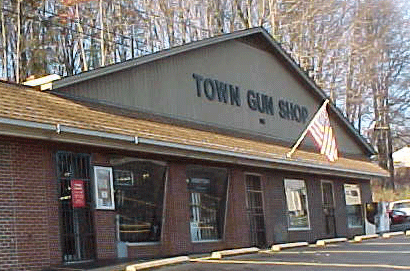 The Law Committee on the Board of Trustees met on Tuesday to deliberate on proposed changes to the zoning of gun and vape shops in Scarsdale and later met with the Sustainability Committee to address the issue of clear cutting of trees in development lots.
The Law Committee on the Board of Trustees met on Tuesday to deliberate on proposed changes to the zoning of gun and vape shops in Scarsdale and later met with the Sustainability Committee to address the issue of clear cutting of trees in development lots.
After a gun store opened in Harrison in late 2016, many Westchester communities, including Scarsdale, have been taking precautionary measures to restrict the ability for gun shop owners to open stores in their municipalities. The recent vaping crisis in Scarsdale, however, has emboldened the board to make the proposed gun store provisions also apply to vape shops. The provisions are based on maximizing the distance between gun stores and schools, daycare centers, and religious facilities.
The board has proposed that gun and vape shops be strictly limited to the VCR 1.0 Zone. This zone encompasses a tiny portion of Garth Road between the Freightway and Eastchester border. The board proposed restrictive zoning over a blanket ban of these stores due to fear of serious litigation that could ensue since it’s difficult to limit what a store can sell. Former Village Attorney Wayne Esannason compared these stores to the adult entertainment stores in New York City. The city could not enforce an outright ban on these stores, so instead they took measures to severely restrict the locations in which these stores can be located. New Village Attorney Angela Martin also added that a California municipality did implement a gun store ban and was brought to court over the issue, but was ultimately upheld by the court in their ban. She stressed that Scarsdale wouldn’t necessarily see an identical outcome if a similar ban was implemented.
The definition proposed for “firearm”, which was based on the federal definition, excluded antique firearms. Trustee Ross pointed out that antique guns should be subject to the same restrictions as standard firearms, as they can still cause harm to others. The board agreed with Trustee Ross, and the change was made.
The board proceeded to a discussion of vape shops. Multiple stores in Scarsdale, including the soon-to-reopen 7/11, already sell e-cigarettes/vaping products. This posed a serious quandary for the board: would the new zoning law apply to both new and existing stores looking to sell vape products, or could exisiting stores still sell vapes under pre-existing and non-conforming use? Trustee Ross expressed concern over the ability to enforce a new law on pre-existing stores and potential litigation that could ensue. He instead suggested that the village might be able to prohibit further expansion of vape products within these stores (i.e no additional square footage of display/stock). Ms. Martin disagreed, saying that as long as sufficient time was allocated for these stores to phase out the vape products, the law could be passed without the non-conforming use policy.
After debating the feasibility of the pre-existing and non-conforming use of vapes/e-cigarettes, Trustee Arest commented on the proposed law as a whole. While he believes the intent is admirable, he questioned the effectiveness of any law the board can’t fully enforce. Trustee Arest recently met with Jack Waxman, the former SHS senior who created an anti-juuling documentary and has been outspoken on the issue of vaping in Scarsdale. According to Waxman, Scarsdale students are getting their vape paraphernalia online, in neighboring areas, and with fake ids, so Arrest wondered if the board was truly making any impact whatsoever. Mayor Hochvert put it best: “We can’t change the world around us, but we can send a signal”.
Trustee Arest also took issue with the proposed zoning of the gun/vape shops. While the VCR 1.0 Zone isn’t near any Scarsdale schools or religious centers, it is located only one block away from a nursery school in Eastchester. Trustee Finger pointed out that Scarsdale has very little retail space relative to towns like Eastchester, and while it may not be ideal, any other zone would have closer proximity to Scarsdale schools and religious facilities.
The conversation proceeded to address the issue of storage and safety in both gun and vape shops. The board agreed that bulk storage cannot be located in the display case of gun stores in case of a robbery. The board also agreed to take out a security provision that stopped minors and people without gun licenses from entering a gun store as it could pose legal problems and would be difficult to enforce. The board found the e-cigarete storage provision, which states that “public access to [e-cigarette storage area] should be limited,” to be a bit unclear and asked Ms. Martin to further define “limited access" moving forward.
Noah Kroloff used the public comment period to express support for the board’s proactive efforts in stopping the spread of gun stores, but asked if they could potentially pursue an outright ban. Trustee Veron said that the board will come to a conclusion first on the proposed zoning limitations and stated that an outright ban would be legally disastrous before voting on any change to the current law.
The Law Committee will consider all comments and decide whether or not to proceed with a vote on the gun/vape shop restrictions.
Immediately following the gun/vape shop meeting, the Law and Sustainability Committees met to discuss potential changes to the village tree laws. The goal of any amendment to the current law is to resolve the issue of clear cutting, or the mass removal of trees from a specific plot of land.
The board put forward two proposals that would require trees which were cut down to be replaced or the owners of the property would have to make a payment to the Tree Preservation Fund. Both options are similar, but Option B does not allow more than 240” of aggregate DBH (the diameter of the tree trunk) to be removed on a given property.
Trustee Veron warned that the proposed plans might have unintended consequences. Someone might need to remove a tree or two for safety reasons, and this law would hold them to the same standards as developers who want to clear cut entire properties. She believes the current plan doesn’t target clear cutting enough, as the fine for not replacing a tree would be minimal to a large scale developer.
Trustee Crandall stressed that there should perhaps be a provision in the law to encourage planting, so if a tree can’t be preserved, a new tree can replace it and eventually fill the environmental role the former tree held.
During public comment, one resident shared her story of a developer that clear cut the trees in an adjacent property, resulting in the loss of a shade canopy and an increase in floodwater during storms. Other public commenters expressed similar sentiments to Trustee Veron, and want the new law to target developers and not infringe on current owner’s private property rights.













